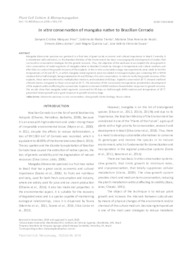In vitro conservation of mangaba native to Brazilian Cerrado.
In vitro conservation of mangaba native to Brazilian Cerrado.
Autoria: PIRES, D. C. M.; TRENTO, S. de M.; PAULA, M. S. P. de; ASMAR, S. A.; LUZ, J. M. Q.; SOUZA, A. V. de
Resumo: Mangaba (Hancornia speciosa var. gardneri) is a fruit tree of great social, economic and cultural importance in Brazil. Currently, it is threatened with extinction, so the Brazilian Ministry of the Environment has been encouraging the development of studies that can result in conservation strategies for this genetic resource. Thus, the objective of this work was to accomplish the slow-growth in vitro conservation of nodal segments of mangaba native to Brazilian Cerrado by changes in temperature and culture medium, and after that, to conduct the growth recovery of the explants. In the in vitro conservation stage, two experiments were made to test the temperatures of 25 and 20 °C, in which mangaba nodal segments were inoculated in transparent glass jars containing MS or WPM media at full or half strength, being evaluated at 45 and 90 days of in vitro conservation. In order to verify the growth recovery of the explants, these were transferred to multiplication medium, and evaluated at 60 days. Explants conserved at 20 °C showed small and chlorotic leaves compared to those conserved at 25 °C. The reduction of the conservation temperature provided less development of the explants without affecting the survival rate. Explants conserved in WPM medium showed better responses to growth recovery. The results show that mangaba nodal segments conserved for 90 days on half-strength WPM medium and temperature of 20 °C presented slower growth and a good response to growth recovery stage.
Ano de publicação: 2019
Tipo de publicação: Artigo de periódico
Unidade: Embrapa Semiárido
Palavras-chave: Biotecnologia, Conservação ex situ, Crescimento lento, Cultura de Tecido, Hancornia Speciosa, Mangaba, Nativa do Cerrado
Observações
1 - Por padrão são exibidas publicações dos últimos 20 anos. Para encontrar publicações mais antigas, configure o filtro ano de publicação, colocando o ano a partir do qual você deseja encontrar publicações. O filtro está na coluna da esquerda na busca acima.
2 - Para ler algumas publicações da Embrapa (apenas as que estão em formato ePub), é necessário ter, no celular ou computador, um desses softwares gratuitos. Sistemas Android: Google Play Livros; IOS: iBooks; Windows e Linux: software Calibre.
Acesse outras publicações
Acesse a Base de Dados da Pesquisa Agropecuária (BDPA) para consultar o acervo completo das bibliotecas da Embrapa.

